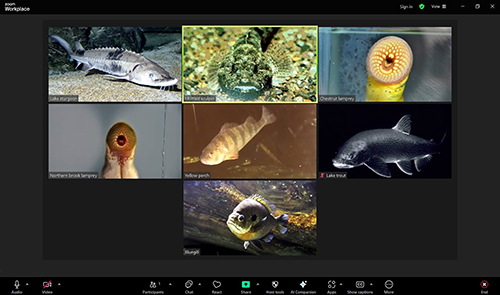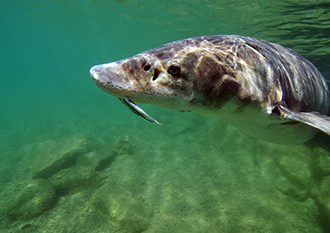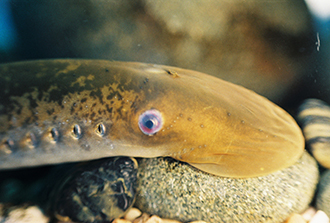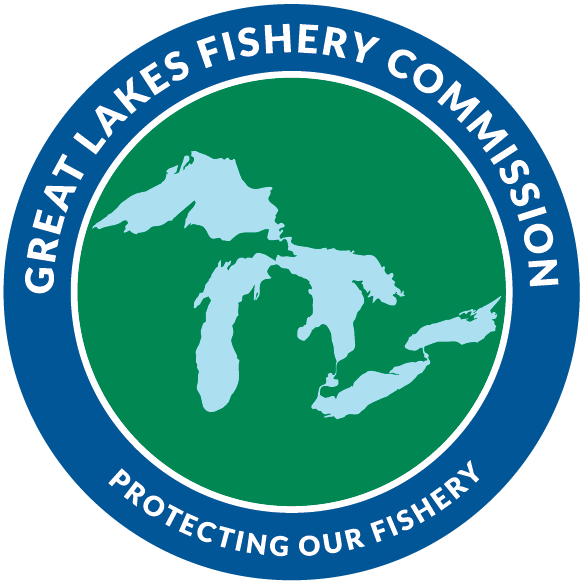Call for Proposals
The Great Lakes Fishery Commission is now accepting pre-proposals for the 2027 funding cycle for the Fishery Research Program and Sea Lamprey Research Program. The Commission's research programs consist of a portfolio of funded basic and applied research organized by designated theme areas.
Pre-proposals and pilot proposals are encouraged to be cross-cutting and address multiple themes or integrate multiple disciplines. Review the theme papers (Sea Lamprey Themes; Fishery Themes) or associated research priorities (Sea Lamprey Control Board Research Priorities; Fishery Research Priorities) to help inform project development and relevance.
The Great Lakes Fishery Commission also supports the submission of pre-proposals investigating fishery management and sea lamprey control issues that have been identified as important to Indigenous Peoples around the Great Lakes, see "Special Topics" for more information on priority research needs. Pre-proposals covering these topics are expected to be Indigenous-led or have Indigenous partners fully engaged at all stages of the project from proposal development to project completion.
Explore examples of successfully funded projects in the commission's Project Catalogue.
Deadline: JANUARY 15, 2026 11:59 PM EST
Webinar
Interested applicants are encouraged to join the informational webinar to learn more about research needs of the Commission and its partners and the research funding process. Webinars will provide interested investigators program-specific information regarding the annual funding cycle and timelines, proposal preparation, submission, and review processes, and will include opportunities to address questions. Webinars will be recorded and available online.
Friday, November 21, 2025, at 12:00 PM EST

Virtual Q/A Sessions with Commission staff and research board members
Looking for additional opportunities to ask questions about our programs or a specific research question? Investigators can book "office hours" to meet with staff and members of the Sea Lamprey Research Board or Board of Technical Experts to discuss research ideas. Twenty-minute Q/A sessions will be available on two upcoming dates:
November 21, 2025, from 1:00 PM - 3:00 PM
December 4, 2025, from 1:00 PM - 3:00 PM
Eligibility
Awards for multi-year projects are typically between $35,000 and $150,000 per year for projects beginning no earlier than January 1, 2027.
Pilot proposal awards must be less than or equal to $20,000 USD and up to one year in length.
Awards are available to academic institutions, Indigenous communities and organizations, government agencies, and private corporations through research contracts.
Post-docs and students may not be Principal Investigators on proposals unless the PI's institution has its own accountability policy as outlined in the commission's PI eligibility policy. Post-docs and students can be recognized as co-PIs.
Review the full description of our pre-award policies.
Submission
Pre-proposal
- Download the pre-proposal instructions and template.
- Pre-proposals are submitted through the online proposal system.
- Deadline: JANUARY 15, 2026 11:59 PM EST - to be considered for funding at the March research board meeting
Pilot proposal
- Download the pilot proposal template.
- Pilot proposals are accepted twice a year.
- *new* Pilot proposals and additional documents must be submitted to the Box submission folder
- All files must be submitted using the naming convention: "PI Last Name_File Name"
- Deadline: JANUARY 15, 2026 11:59 PM EST - to be considered for funding at the March research board meeting
- Deadline: JULY 15, 2026 11:59 PM EST - be considered for funding at the September research board meeting.
Special Topics
In addition to the research needs highlighted in the theme areas (Sea Lamprey Themes; Fishery Themes), the Great Lakes Fishery Commission invites proposals on these special topics for the 2027 funding cycle:
Fishery Research Program
- Indigenous-led research
-
The Indigenous Great Lakes Network identified ecosystem conservation and protection, data and technology, contaminants, environmental restoration and reclamation, ecosystem monitoring and protection, fish research and management, and effects of mining as priority areas of research.

In response to these needs, and in the broader context of issues important to Indigenous communities, we seek Indigenous-led research proposals on stewardship of fish populations that include Indigenous knowledges and that enhance community capacity. Specifically, we are looking to fund projects with a focus on cultural keystone species. We strongly encourage management/stewardship—Indigenous community partnerships and knowledge co-production among Nations and Tribes. Methods may include, but are not limited to, case study evaluations, 'learning by doing', co-production of knowledge that informs adaptive management actions, and other action-oriented collaborative efforts.
-
- Effects of emerging contaminants and pollutants on fishes of the Great Lakes
-
Multiple emerging contaminants and sources of pollution have been identified in the Great Lakes and could have negative effects on fishes. In particular, and consistent with the International Joint Commission (IJC)'s Great Lakes Science Advisory Board's report "Monitoring, Ecological Risk Assessment, and Management of Microplastics in the Laurentian Great Lakes," the Great Lakes Fishery Commission is making funds available for research to strengthen ecological risk assessments of microplastics pollution, with a focus on effects to fish and fisheries. Proposed studies should use IJC Standard Operating Procedures for sample collection and standardized methods for microplastics analysis. Specifically, research focused on the following topics is invited:
-
Microplastics exposure and direct effects of microplastics on fish health
-
What does the water and sediment microplastic exposure landscape look like and how does exposure vary across space, time, and life stage?
-
How does microplastic exposure affect fish health, disease susceptibility, or other non-lethal effects?
-
-
Method development and analytical approaches
-
Can rapid testing methods and high-throughput methods for microplastics detection and quantification in fish be developed?
-
-
-
-
Council of Lake Committee (CLC) Research Priority Update
-
Special Topic for 2026: Lake Whitefish, Dreissenid mussels and lower food web change
-
The Council of Lake Committees wants to prioritize research related to lake whitefish and the link to Dreissenid mussel control.
-
The Council of Lake Committees has updated its basin-wide priorities to include recruitment, food-web dynamics, and habitat restoration. Please visit the CLC theme page for more information.
-
-
Sea Lamprey Research Program
- Impacts of climate variability on sea lamprey control
-

The Sea Lamprey Control Board is concerned about the potential effects of climate variability on lampricide treatments and barrier efficacy. Understanding how climate factors impact the different elements of sea lamprey control are critical for developing a climate-adapted program to maintain effectiveness under future scenarios. These include, but are not limited to, treatment effectiveness under varying temperatures, alkalinity, pH, and flow, timing of treatments, and understanding changes in physical river conditions and barrier stability associated with more frequent extreme weather events.
-
- Population level effects of lampricides on non-target organisms
-
The Sea Lamprey Control Program is keenly interested in understanding the population level effects of lampricides on non-target organisms. Organisms of concern include, but are not limited to, mudpuppies, native lampreys, native mussels, and any state/provincial or federally listed aquatic species. Additional research in this area would help further our understanding of how non-target species respond and recover from lampricide exposure and would inform treatment protocols to minimize negative effects. Key documents to reference include Kaye 2021, Pratt et al. 2021.
-
- Improved understanding of granular Bayluscide® effectiveness
Granular Bayluscide (gB) is used for sea lamprey assessment and treatment as a cost-effective alternative to TFM. Currently, the program uses a mean effectiveness of 75% during gB control efforts (Fodale et al. 2003; Sullivan et al. 2021). There is a critical need to more accurately quantify gB effectiveness as a lampricide and understand how it is influenced by abiotic and biotic variables. Specifically, we are interested in research focused on how pH, alkalinity, and temperature affect gB effectiveness. Additional research on the effects of sediment types, water velocity and turbulence, depth, and vegetation is also needed.
Evaluation
- Pre-proposals are evaluated based on five areas, (1) relevance, (2) novelty, (3) feasibility, (4) research excellence, and (5) responses to previous reviews (if applicable). Successful pre-proposals will be advanced to full proposals; review last year's template* for additional evaluation criteria.
*Note: the full proposal template is currently under revision, if your pre-proposal is accepted please check back in April for a new version.
- Relevance: Pre-proposals are evaluated for relevance and against information needs identified by the Research Themes under which they are submitted, and the research needs identified by the Sea Lamprey Control Board and Council of Lake Committees. Review the theme papers (Sea Lamprey Themes; Fishery Themes) or associated research priorities (Sea Lamprey Control Board Research Priorities; Fishery Research Priorities). Pre-proposals submitted under non-theme will be evaluated for their relevance to the commission's Strategic Vision.
- Novelty: Pre-proposals should clearly demonstrate how the proposed research is innovative, breaking new ground, or is building on past work, which will generate critical information to the commission’s programs.
- Feasibility: Methods should clearly demonstrate how the work is achievable given the proposed methods, timeline, and budget.
- Research Excellence: Demonstration of core competencies to ethically and responsibly conduct research. Proposals should demonstrate how the research will be conducted in a responsible and ethical way. Investigators should consider how their project (1) uses an interdisciplinary team approach and involves all team members in project implementation; (2) includes methods that are ethical, collaborative, and use participatory approaches; (3) fosters training and leadership development for all team members; and (4) ensures that results and deliverables will reach appropriate audiences.
- Letter of Response (if applicable): Investigators resubmitting a pre-proposal should demonstrate how they addressed board and/or reviewer feedback provided for the previous submission in both the pre-proposal and letter of response.
- Pre-proposals from new and early career investigators are evaluated against the same criteria and compete for the same funding as established investigators; however, bringing new and early career investigators into the programs is a high priority. To the extent possible, new investigators are provided opportunities to engage with the research board to further develop submissions. Review the new and early career investigator criteria to determine if you are eligible. New and early career investigators are strongly encouraged to reach out to the Science Director at research@glfc.org in advance of a pre-proposal submission.
Additional Resources
- Investigators may explore examples of successfully funded projects in the Commission's Project Catalogue.
- Visit Resources for Researchers for information on additional support from partnering facilities and organizations.
- Watch previous informational webinars to learn more about the research needs and funding process:
- Fishery Research Program: https://youtu.be/amh9ryh_2U0
- Sea Lamprey Research Program: https://www.youtube.com/watch?v=2FS1H6u31kU
- Developing a successful research proposal: https://www.youtube.com/watch?v=ppD3r8x3EKw
- Contact the Science Director at research@glfc.org for questions about the research programs or research ideas.
Review Process & Timeline
- January 15 - Pre-proposals due to the online portal. Pilot proposals and additional documents due to the submission folder.
- Early March - Pre-proposals and pilot proposals reviewed by the Board of Technical Experts (FRP) and Sea Lamprey Research Board (SLRP). New investigators may be invited to give a virtual presentation to the board if it is their first time submitting the idea to the research program.
- March 31 - Investigators notified of decision. Authors of successful pre-proposals are requested to develop a full proposal. Investigators notified of spring pilot proposal funding decisions.
- June 01 - Full proposals due from successful pre-proposals.
- July 15 - Pilot proposals and additional documents due to the submission folder.
- Mid-September - Full proposals and pilot proposals reviewed by the Board of Technical Experts (FRP) and Sea Lamprey Research Board (SLRP).
- September 30 - Investigators notified of board recommendations. Recommended proposals are requested to submit a letter of response to board comments. Investigators notified of fall pilot proposal funding decisions.
- December - Investigators notified of commission funding decisions.
If you have questions regarding the research programs or a proposal submission, please contact Science Directorate staff at research@glfc.org or call 734-662-3209 SLRP ext. 158, FRP ext. 120.
If you would like to be notified of future calls for proposals please subscribe to our call for proposals list.

